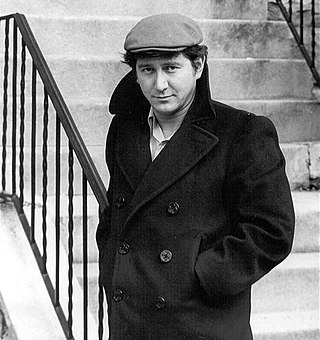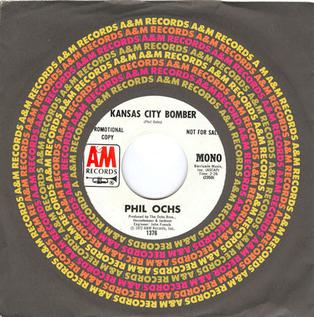
Philip David Ochs was an American songwriter, protest singer, and political activist. Ochs was known for his sharp wit, sardonic humor, and political commentary. He wrote approximately 200 songs throughout the 1960s and 1970s, and released eight albums.

The "Battle Hymn of the Republic" is an American patriotic song written by the abolitionist writer Julia Ward Howe during the American Civil War.
"Outside of a Small Circle of Friends" is a song by Phil Ochs, a U.S. protest singer from the 1960s. "Outside of a Small Circle of Friends", which was originally released on Ochs' 1967 album Pleasures of the Harbor, became one of Ochs' most popular songs.
Jim and Jean, composed of Jim Glover and Jean Ray (1941–2007) were an American folk music duo, who performed and recorded music from the early to the late 1960s.
Jim R. Glover is an American peace activist and folk singer. He is from Cleveland, Ohio and lives in Brandon, Florida.

What's That I Hear?: The Songs of Phil Ochs is a 1998 tribute compilation to the music of the late Phil Ochs. The various performers cover several generations of Ochs' admirers. All profits from the album's sales were divided equally between the non-profits, the ACLU Foundation of Southern California and Sing Out! Magazine.

"I Ain't Marching Any More" is an anti-war song by Phil Ochs, a U.S. protest singer from the 1960s known for being a passionate critic of the American military industrial complex. Originally released on his 1965 album of the same name, "I Ain't Marching Any More" is one of Ochs's best-known songs.
"The War Is Over" is an anti-war song by Phil Ochs, an American protest singer in the 1960s and early 1970s. Ochs was famous for harshly criticizing the Vietnam War and the American military-industrial establishment. The song, which was originally released on Tape from California (1968), has been described as "one of the most potent antiwar songs of the 1960s".
"There but for Fortune" is a song by American folk musician Phil Ochs. Ochs wrote the song in 1963 and recorded it twice, for New Folks Volume 2 and Phil Ochs in Concert. Joan Baez also recorded "There but for Fortune" in 1964, and her version of the song became a chart hit.

The discography of Phil Ochs, a U.S. protest singer and songwriter, consists of seven studio albums, six live albums, six compilation albums, one box set, six other albums, and nine singles.
"Crucifixion" is a 1966 song by Phil Ochs, a US singer-songwriter. Ochs described the song as "the greatest song I've ever written".

"Kansas City Bomber" is a song by Phil Ochs, a US singer-songwriter best known for the protest songs he wrote in the 1960s.
"Cross My Heart" is a 1966 song by Phil Ochs, an American singer-songwriter best known for the protest songs he wrote in the 1960s.

"My Life" is a 1969 song by Phil Ochs, a US singer-songwriter best known for the protest songs he wrote in the 1960s.

Phil Ochs: There but for Fortune is a documentary film on the life and times of folk singer-songwriter Phil Ochs. The film, released theatrically in January 2011, was written and directed by Kenneth Bowser. Its title is taken from one of Ochs' best known songs, "There but for Fortune" (1963).
Sonia "Sonny" Ochs is a music producer and radio host. She is known for the "Phil Ochs Song Nights" she organizes, at which various musicians sing the songs of her brother, singer-songwriter Phil Ochs.
"Love Me, I'm a Liberal" is a satirical political song by Phil Ochs, an American singer-songwriter. Originally released on his 1966 live album, Phil Ochs in Concert, "Love Me, I'm a Liberal" was soon one of Ochs's most popular concert staples.
"Here's to the State of Mississippi" is a civil rights protest song by Phil Ochs, an American topical singer and songwriter in the 1960s. Ochs is best known for his anti-war and freedom songs. "Here's to the State of Mississippi" was released in 1965 as the last track on his album I Ain't Marching Anymore. The song criticizes the state of Mississippi for its oppression of African Americans. It describes how Jim Crow laws and white supremacy in the South maintained the inequality of African Americans in states such as Mississippi. "Here's to the State of Mississippi" touches on segregation, corrupt and biased school systems, the frequent murders of African Americans and civil rights activists and the crookedness of government officials who ignored or collaborated in the murders. Its refrain advised Mississippi to "find yourself another country to be part of".






